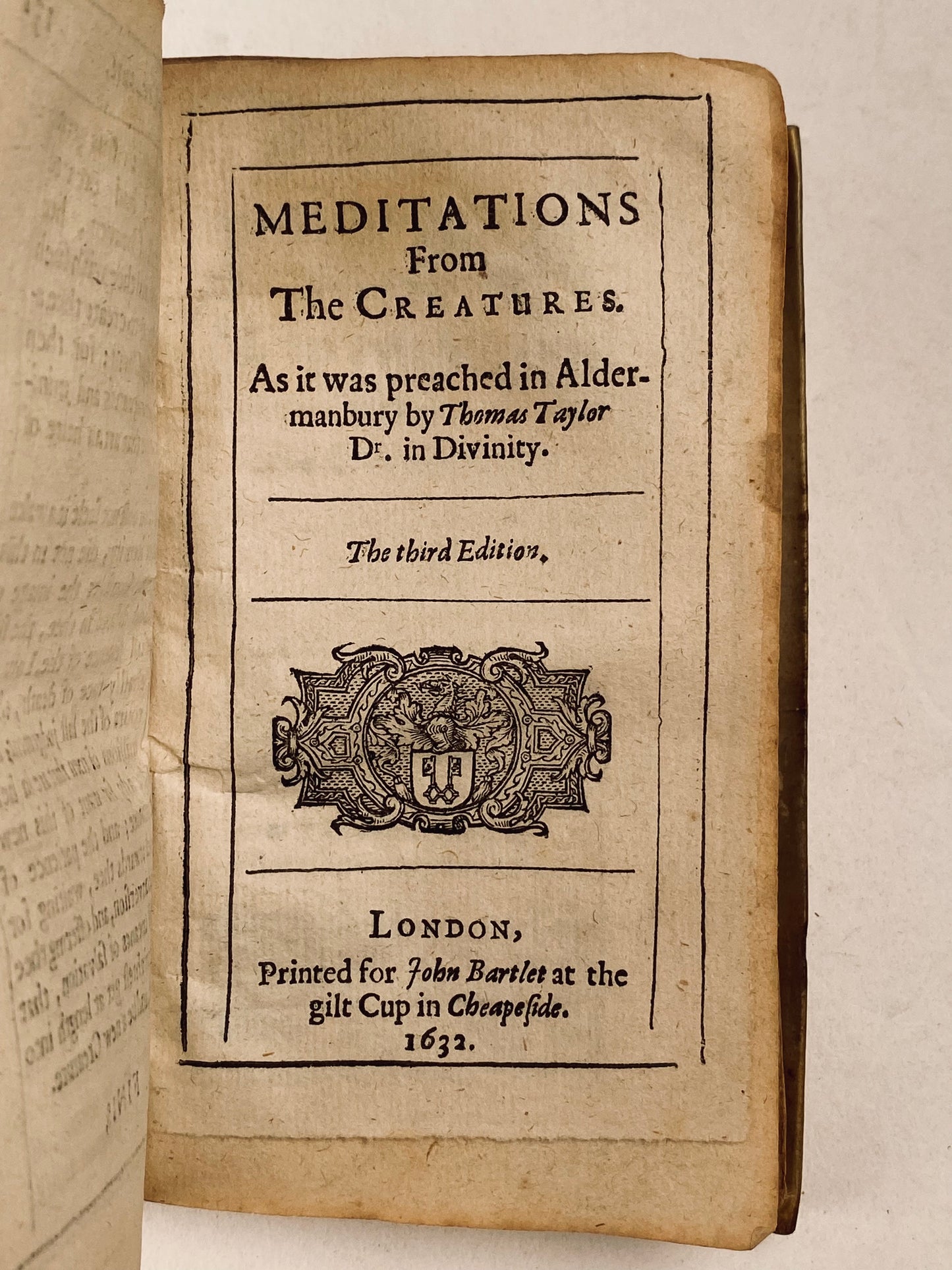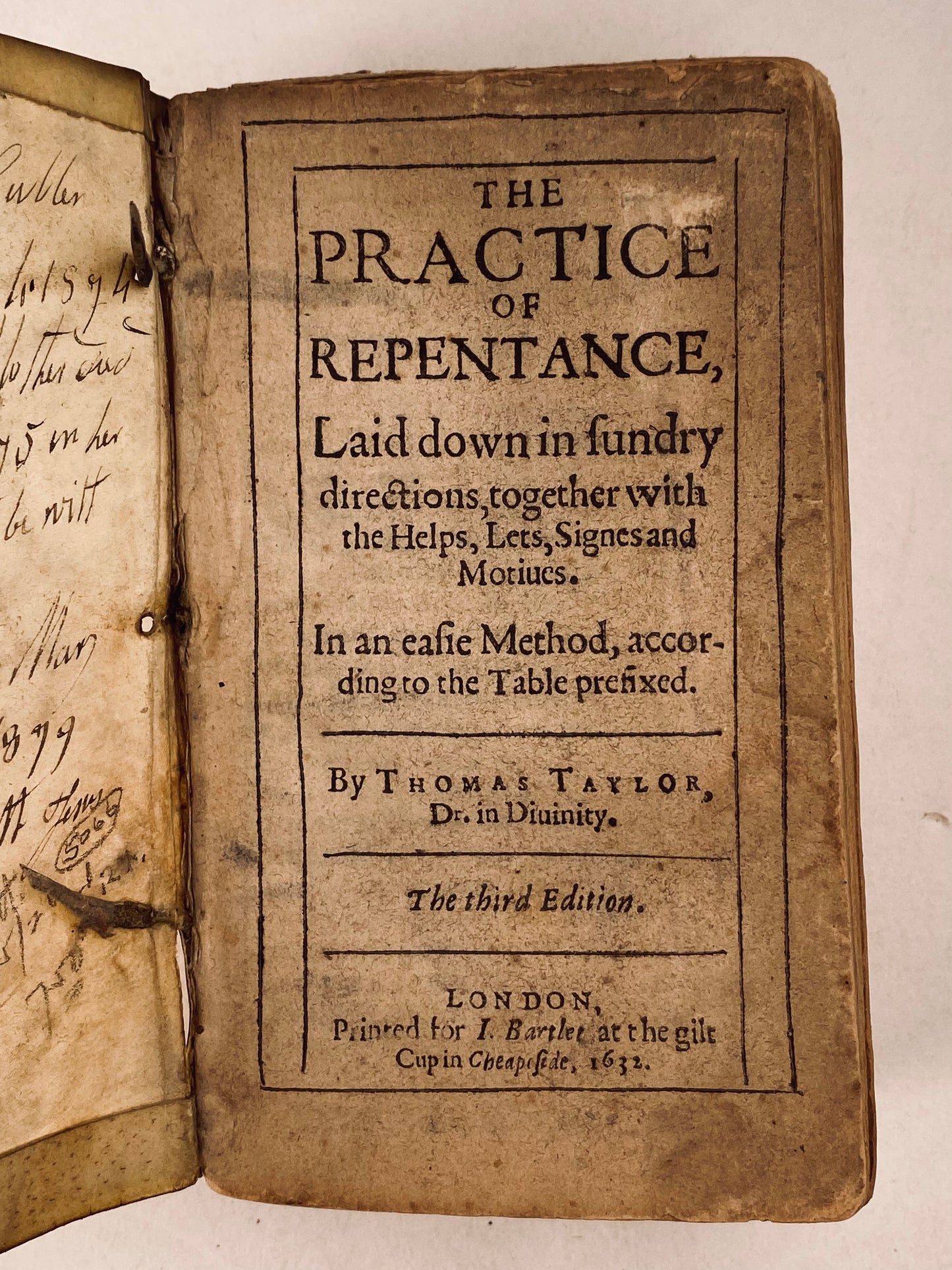Specs Fine Books
1632 THOMAS TAYLOR. Works of Early Puritan on Repentance, The New Creation, and God in Nature!
1632 THOMAS TAYLOR. Works of Early Puritan on Repentance, The New Creation, and God in Nature!
Couldn't load pickup availability
A wonderful group of three early Puritan works by eminent divine, Thomas Taylor [1576-1632]. The son of a prominent supporter of the Dissenters and helped assist the fleeing Scottish divines during the persecution in that country, Thomas himself was an early disciple of the famed William Perkins. A young man of keen gifts, lively piety, and an active mind, he began preaching at 21 years of age and preached before Queen Elizabeth at just 25 years old. He was over and again silenced and censured for non-conformity, for preaching on the responsibility of the Crown to Christ rather than the other way around, and for supporting non-conformist causes.
Spurgeon says of him that he was, and this is high praise indeed, "one of the richest in matter of all the Puritans."
Bound in a handsome little original vellum 12mo volume we have three choice works, each of great value in its own way.
1. Taylor, Thomas. The Practice of Repentance, Laid Down in Sundry Directions, Together with the Helps, Lets, Signes, and Motives. In an Easie Method, According to the Table Prefixed. London. Printed for I. Barker at the Gilt Cup in Cheapside, 1632. 395pp.
A superb and searching work on measure with Thomas Watson's classic.
"If Satan cannot prevail to make us despair in regard to God's mercy, he will assay to bring us to despair of ourselves, and our own estates: that although the Lord have mercy in the full sea and ocean of it, yet thou, saith he, art unworthy of the least drop of it. Mercy is for vessels of mercy; but thou art a vessel of wrath, a grievous sinner, & God's justice treasureth wrath as fast against the soul. It is in vain for thee to repent; God will be found of his own children, not of such as thou art.
Answer: 1. God never loved any man for his own worthiness, or any thing in any man causing his love: and all the worthiness in the most and best worthy, is but an effect of God's love, but no cause at all. For, what worthiness in us before we were, that moved him to elect us to salvation? What worthiness in us being yet sinners and enemies, that he should with so dear a price redeem us?
2. The best and dearest to God, durst never appear in their own worthiness. Paul himself, regenerate, would not be found having his own righteousness, but that which was by faith in Christ. Jacob must come to his father for a blessing in the garment of his elder brother: we must cast of our rags, before we can put on the wedding garment.
Never any of the Saints were capable of mercy, but by an holy despair of themselves and of their own worthiness: and therefore did seek, and find a worthiness elsewhere, because they could find non in themselves."
[bound with]
2. Taylor, Thomas. A Man in Christ, Or, a New Creature. London. Printed for J. Bartlet at the Gilt Cup in Cheapeside, 1632. 131pp.
A superb treatise on the power of the work of grace in the child of God. A wonderful work.
[bound with]
3. Taylor, Thomas. Meditations from the Creatures. As it was Preached in Aldermanbury by Thomas Taylor, Dr. in Divnity. London. Printed for John Bartlet at the Gilt Cup in Cheapeside. 1632. 104pp.
I love this beautiful work; one of the only Puritan works I'm aware of like it. Taylor explores Creation as an instance of God's self-disclosure through a series of theological meditations. As an example:
"Do I see that God made not light for himself; for he being light itself, needed it not; but for me amongst others: how can I but admire his care and goodness? How can I choose but gather what light and comfort is in himself, who hath put so much in the creature? And rise by it to his Divinity, who (as light) so communicateth himself, that no man the less, because another more? Do I see the light made so pure, fair, clear, and perfect, as nothing can pollute it? If it looketh into all filthiness, it contracts none. How can I but herein see an excellent resemblance of God's infinite purity and perfection of His essence, in his eternal love, in whom is no darkness, to whom nothing is more contrary than darkness? And though he behold all darkness and order all confusion, yet in his divine understanding, is not any obscurity or dimness"
Original vellum, darkened and worn as shown; ties absent. Textually quite good and block quite sound, though a bit proud toward the middle. Very scarce.
Share








